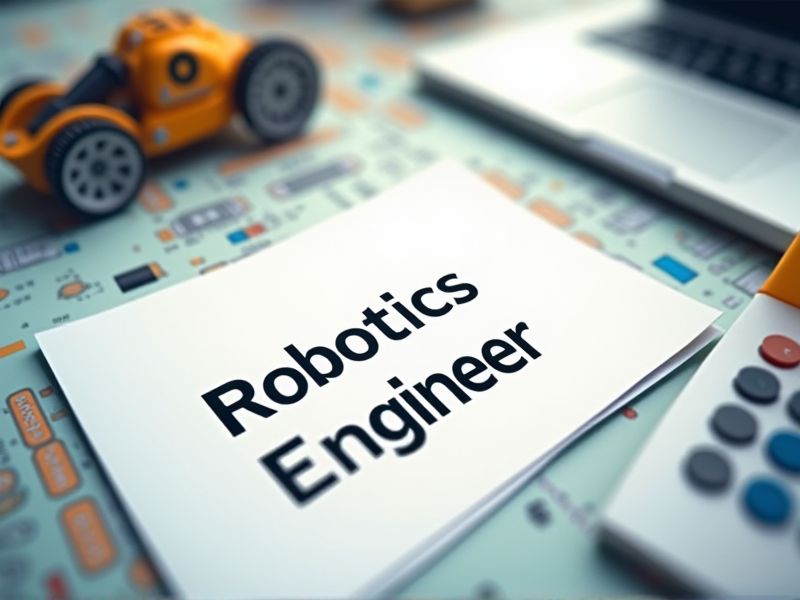
Robotics engineering involves complex systems that require specialized knowledge in fields such as mechanics, electronics, and computer programming. Obtaining certain certifications ensures that a robotics engineer has up-to-date skills and conforms to industry standards. Certifications also enhance credibility and improve career prospects by demonstrating expertise to employers. Some important certifications you may need as a robotics engineer include Robotics Process Automation (RPA), Certified LabVIEW Developer, and FANUC Robotics Certification.
Certified Robotics Engineer (CRE)
The complexity of modern robotics systems requires specialized skills, which a Certified Robotics Engineer (CRE) possesses, ensuring effective problem-solving and design. Certification validates a professional's competency, instilling confidence in employers regarding the engineer's ability to handle advanced robotic tasks. A CRE stays updated with the latest industry standards and technological advancements, driving innovation in robotic solutions. Employing certified engineers reduces project risks, leading to more efficient and successful deployments of robotics applications.
ROS Developer Certification
The ROS Developer Certification validates a robotics engineer's skills in utilizing the Robot Operating System, potentially increasing job prospects and salary expectations. Employers often seek certified professionals to ensure efficiency and proficiency in developing and integrating robotic systems. Certification aids in reducing development errors due to the proven competency of certified individuals. It also promotes continuous learning and staying updated with the latest advancements in robotics technology.
Industrial Robotics Certification (RIA)
The Industrial Robotics Certification (RIA) serves as a recognized standard, validating a robotics engineer's expertise and skills in the field. Holding this certification increases job prospects, as employers often prefer candidates with proven proficiency in robotics technology. Certified engineers are typically better equipped to implement safety standards and troubleshoot complex robotic systems, which can lead to increased operational efficiency. Acquiring the RIA certification can also lead to higher earning potential, reflecting the value and credibility that certified professionals bring to their roles.
Automation and Control Systems Certification
Automation and Control Systems Certification enhances a robotics engineer's ability to design and implement efficient control algorithms. This certification validates expertise in modern industrial standards, increasing employability in competitive job markets. Knowledge of automation protocols improves the integration of robotics within existing systems. Certification ensures the engineer is equipped with skills to address complex challenges in robotics applications.
Mechatronics Engineering Certification
A Mechatronics Engineering Certification provides foundational knowledge in mechanical, electrical, and computer engineering, all essential for robotics work. This certification enhances a professional's ability to integrate various subsystems effectively, a critical skill in robotics. Employers often prefer candidates with specialized certifications, demonstrating proficiency and commitment. It signifies that the individual is up-to-date with current technologies and best practices in robotics and automation.
Machine Learning Professional Certification
Machine Learning Professional Certification equips robotics engineers with the skills to develop intelligent robots capable of learning from their environments. With this certification, engineers can integrate advanced algorithms to improve robotic decision-making and adaptability. The certification validates expertise in data-driven techniques, crucial for optimizing robot performance in complex tasks. Possessing this credential can enhance career prospects, signaling a robust understanding of cutting-edge machine learning applications in robotics.
AI for Robotics Certification
The integration of AI in robotics requires specialized knowledge that a certification can provide, ensuring that engineers stay current with evolving technologies. Many companies seek professionals with demonstrated expertise in AI-driven robotics, making a certification crucial for career advancement. Robotics systems increasingly rely on complex AI algorithms, and a structured certification program equips engineers with essential skills to manage these complexities. With the rapid advancement of technology, a certification demonstrates an engineer's commitment to continuous learning, enhancing their credibility in the field.
Computer Vision Specialist Certification
Robotics engineers increasingly implement image-based machine learning algorithms, necessitating expertise in computer vision to effectively process and interpret visual data. As robots become more autonomous, the ability to recognize and react to complex environments hinges on advanced computer vision skills. Certification in this field provides a standardized validation of a robotics engineer's capabilities, enhancing trust and reliability in their skillset. Companies focusing on automation and robotics prioritize hiring certified individuals to ensure their projects are handled by professionals familiar with the latest computer vision technologies and practices.
Embedded Systems Programming Certification
Robotics engineers work with complex systems requiring precise control, and an Embedded Systems Programming Certification ensures they have the necessary skills to develop reliable software for these devices. With the growing demand for automation, expertise in embedded programming allows engineers to design more efficient and responsive robots. The certification demonstrates proficiency in handling real-time constraints and low-level programming crucial for robotic applications. Employers seek certified professionals because they are more likely to adhere to industry standards, enhancing both safety and performance in robotic systems.
PLC Programming and Automation Certification
Robotics engineers benefit from a PLC Programming and Automation Certification because it enhances their ability to design and manage programmable logic controllers, essential for robotics systems. Mastery of automation concepts allows engineers to streamline robotic operations, improving efficiency and reliability. Certification showcases validated skills, increasing employability and career opportunities in advanced manufacturing and automation sectors. It updates engineers on the latest technological advancements, ensuring their expertise remains relevant in a rapidly evolving industry.
Summary
When you obtain certifications as a Robotics Engineer, you gain validation of your skills and expertise, enhancing your professional credibility. This often results in increased job opportunities and potentially higher salaries due to the specialized knowledge you bring. Employers tend to prefer certified professionals, which can lead to greater job security and career advancement. Networking opportunities and industry recognition also expand, connecting you with a broader professional community.
